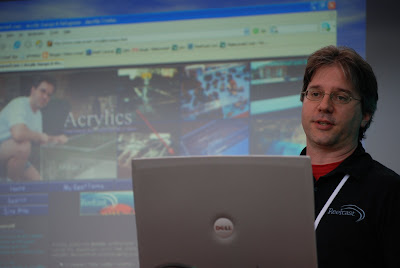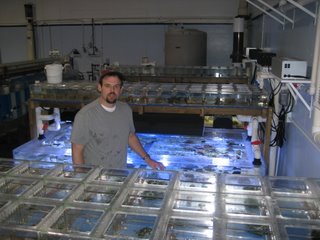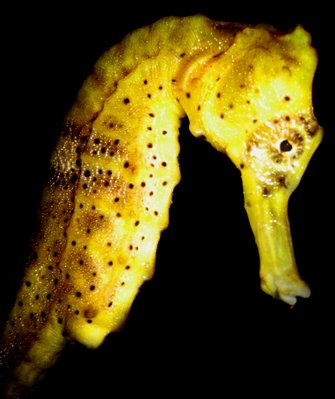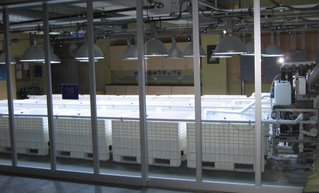 Back then, the captive maintainance of reef building stony corals was still considered impossible by many. Today there are literally thousands of reef aquarist around the world that are not only maintaining these corals but they are successfully farming them. Over the years Steve has managed to acquire a large collection of rare and exotic corals.
Back then, the captive maintainance of reef building stony corals was still considered impossible by many. Today there are literally thousands of reef aquarist around the world that are not only maintaining these corals but they are successfully farming them. Over the years Steve has managed to acquire a large collection of rare and exotic corals. Steve showed photos of some amazing coral pieces from the best collectors in the US. Including Eric Caamano of Frag Farmers, Greg Carroll and John Dakaan of Your Reef in Roseville, CA.
Steve showed photos of some amazing coral pieces from the best collectors in the US. Including Eric Caamano of Frag Farmers, Greg Carroll and John Dakaan of Your Reef in Roseville, CA.They all had some very unique and interesting names. Some of my favorites included Area 51, Pastel War and Peace, Blueberry Montipora, Strawberry Patch Montipora, Seasons Greetings Montipora, Red Hot Chili Pepper Digitata, Bazooka Joe Chalice, Bubble Gum Chalice and the Miami Hurricane Chalice.
Steve is bringing back the 2008 Bay Area Coral Farmers Market,Third Annual Event,
Sunday, May 11th, 2008, 10:30 AM to 4 PM, Hilton Newark/Fremont Hotel,39900 Balentine Dr., Newark, California 94560.
 From the Coral Farmers website: This 2008 Coral Farmers Market sanctioned event is the third annual event run by the Bay Area Coral Farmers Market company. Coral farming and exhibiting vendors will be selling or displaying their captive grown, cultured corals or reef related products to the public. We expect over 200 total attendees. Some of the best coral farming vendors from Southern California, the Bay Area, the states of Utah, Nevada and Arizona along with farmers from Sacramento will be setting up coral displays. Farmers include aquarists, retail reef shops, online coral shops and full scale coral farming enterprises. There will also be exhibitors present who will be demonstrating and selling their products. This SW-CFM event will also feature coral auctions, raffles and door prizes throughout the day. Reef aquarists new to the captive reef market can also expect to see a fine collection of easy to keep beginner corals. Aquarists and enthusiasts can attend this one-day event by purchasing a SouthWestern Coral Farmers Market day ticket online for ($15) up to one month prior to the event. Within 1 month of the event the online ticket price is ($25) per ticket. Tickets will also be sold at the door ($30) during the day of the event, but may be limited by occupancy restrictions. We are also encouraging our farmers to bring plently of farmed soft corals along with their usual excellent farmed stony corals.
From the Coral Farmers website: This 2008 Coral Farmers Market sanctioned event is the third annual event run by the Bay Area Coral Farmers Market company. Coral farming and exhibiting vendors will be selling or displaying their captive grown, cultured corals or reef related products to the public. We expect over 200 total attendees. Some of the best coral farming vendors from Southern California, the Bay Area, the states of Utah, Nevada and Arizona along with farmers from Sacramento will be setting up coral displays. Farmers include aquarists, retail reef shops, online coral shops and full scale coral farming enterprises. There will also be exhibitors present who will be demonstrating and selling their products. This SW-CFM event will also feature coral auctions, raffles and door prizes throughout the day. Reef aquarists new to the captive reef market can also expect to see a fine collection of easy to keep beginner corals. Aquarists and enthusiasts can attend this one-day event by purchasing a SouthWestern Coral Farmers Market day ticket online for ($15) up to one month prior to the event. Within 1 month of the event the online ticket price is ($25) per ticket. Tickets will also be sold at the door ($30) during the day of the event, but may be limited by occupancy restrictions. We are also encouraging our farmers to bring plently of farmed soft corals along with their usual excellent farmed stony corals.Steve's presentation can be downloaded here. Use the links on the left of the page.
To listen, click the play button below.
















































































